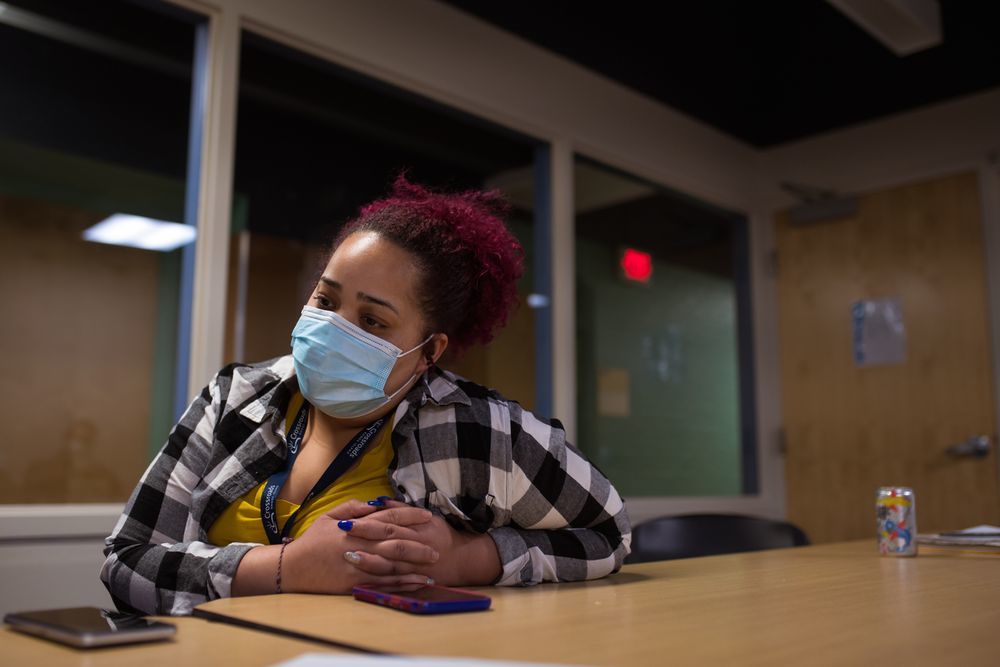The federal pandemic response program provided billions of dollars nationwide to create housing vouchers meant to get unhoused people into permanent housing.
January 26, 2022
Story produced The Public's Radio, featuring Crossroads' and its clients.
When Dale Bonanno learned he qualified for a new subsidized housing voucher last fall, he started searching. He’d been living in a men’s shelter for several months, and now, his first apartment to himself in more than fifteen years felt within reach. Bonanno combed through listings on Facebook Marketplace and Craigslist. He called the numbers on the “For Rent” signs in apartment windows he passed walking around Providence. He turned to his caseworker for support. The days and weeks passed. Phone calls went unanswered. He estimates he inquired about roughly 100 units. He got to see three or four.
“Everybody wants you to make like four- or five-times what the rent amount is, and like a 700 credit score and no criminal history,” he said. He worried he would never get past his struggles with alcohol and substance use, and related criminal record.
“The landlords just want way too much,” he said. “They're not willing to give people a chance.”
The voucher Bonanno received was one of 70,000 new emergency housing vouchers that the U.S. Department of Housing and Urban Development (HUD) distributed to about 600 housing authorities across the country last summer. Congress allocated $5 billion to the program through the American Rescue Plan, a significant investment intended to respond to an ongoing homelessness crisis that, in many places, had grown more acute during the pandemic. In Rhode Island, the program stands to help at least 159 of the more than 1,200 Rhode Islanders experiencing homelessness.
The vouchers opened up new opportunities for some of the most at-risk people: a road to permanent housing they can afford. But the program has faced significant challenges getting off the ground. Seven months after Rhode Island received 159 vouchers from the federal government, less than 30% have been put to use. A lack of available — and affordable — units left people like Bonanno on the cusp of stability, struggling to find a permanent place to call home before their voucher expires, in some cases 120 days after it’s issued.
“I think just some landlords are wary,” Bonanno said. “They don't know about the program or they’re just discriminatory in a way.”

‘A Winning Powerball Ticket’ with no way to cash-in
Like other subsidy programs, the new emergency vouchers mean the federal government covers the bulk of the rent for a voucher holder on the private market as long as Congress funds the program. Only people experiencing homelessness, at risk of homelessness, or experiencing domestic violence qualify for the new vouchers.
The holiday season came with good news for Bonanno: a landlord willing to accept his voucher, without too many questions about his past. The apartment is in Westerly — a place he has visited once, to see fireworks — but Bonanno is looking forward to settling into a new part of the state. He’ll keep working with his caseworker for a few months as he connects with local substance use and alcohol recovery groups and builds a new community, away from his history in Providence.
“It's having just the knowledge and security that I have a place to go to, and not have to worry about being homeless next month, or six months from now,” Bonanno said.
But with less than 30% of the vouchers successfully being used, Bonanno’s story remains the exception as the program rolls out.
“It's almost like having a winning Powerball ticket and you can't get to where you need to go to cash in your ticket,” said Karen Roy, director of housing at Crossroads Rhode Island, the state’s largest service provider for people experiencing homelessness. “There's no one to give it to.”
According to data from HUD, just 12% of the available vouchers nationwide have been used to rent an apartment. The data is reported with at least a month lag, but it’s clear that places with some of the largest numbers of people experiencing homelessness like Los Angeles, San Francisco, and Seattle have some of the lowest rates of utilization.
In Rhode Island, less than a third of the vouchers have been used to rent an apartment. In Massachusetts, 76 of 1,780 available vouchers have been used — just 4%. If states don’t use their vouchers fast enough, HUD can recapture the funding.
“It is in response to an incredible problem and incredible need,” Roy said. “It's everybody's dream come true. If I had units.”
HUD awarded 42 vouchers to the Providence Housing Authority and 117 to Rhode Island Housing. Those agencies, the Rhode Island Coalition To End Homelessness and several nonprofits administer the program. Every person who receives a voucher has a case manager who helps manage all the paperwork necessary to receive the subsidy, find available housing, and connect people with services like counseling and drug treatment as needed.
“I go home every day like almost in tears,” said Stephanie
Jones-Pringle, a financial coach at Amos House who also helps with case
management. “It is just so unfair, what's going on with this housing
situation.”
Listen to the full story at www.thepublicsradio.org.

